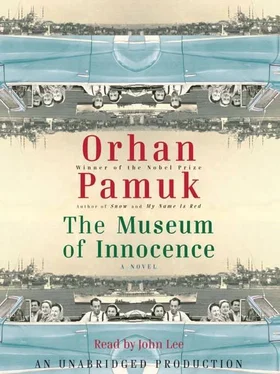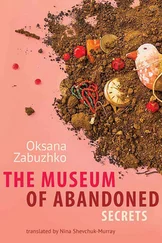One warm evening we went to the Yeni İpek Cinema, located in a long and narrow garden squeezed between the shanties near İhlamur Palace and the backstreets of Nişantaşı, where we sat under the mulberry trees to watch The Agony of Love Ends with Death and a second melodrama, Listen to My Crying Heart , featuring the child star Papatya. As we sat holding our soft drinks during the intermission, Feridun mentioned that the tough guy with the thin mustache playing the crooked accountant in the first film was a friend of his, and was willing to play a similar role in our film. This was the point I realized it would be very difficult for me to enter the Yeşilçam film world purely for the sake of being close to Füsun.
My evasive eyes lit on one of the balconies overlooking the cinema garden, and from the black curtains obscuring its door I realized that this old wooden house was one of Nişantaşı’s two most secret and exclusive backstreet brothels. The girls there loved to joke about how, on summer nights, as they lay with their rich gentleman clients, their cries of love would mingle with the music on the sound track, and the clashing of swords, and actors declaring, “I can see, I can see” in melodramas featuring a pair of sightless eyes suddenly opened. The house had once belonged to a famous Jewish merchant, and his former parlor now served as a waiting room, so whenever the high-spirited, mini-skirted girls got bored, they could go up to one of the empty rooms in the back and watch the film from the balcony.
At the little Yıldız Garden Cinema in Şehzadebaşı, overflowing balconies surrounded the garden on all three sides, in a way that recalled boxes at La Scala. Once, during a scene from My Love and My Pride , a father was castigating his son (“If you marry that good-for-nothing shopgirl I will cut you out of my will and disown you!”), while an argument broke out on one of the balconies, causing some of us to confuse the two disputes. In the Yaz Çiçek Cinema Garden, just next to the wintertime Çiçek Cinema in Karagümrük, we watched The Old Lady Who Sells Simit s , whose screenplay was written by son-in-law Feridun, based, he told us, on a new adaptation of the novel The Bread Seller Woman by Xavier de Montépin. This time it was not Türkan Şoray in the leading role but Fatma Girik, and just above us there was a fatso father unhappy with this state of affairs, so as he sat there in his underwear on the balcony, surrounded by his family, drinking his rakı and eating his mezes, he kept saying, “Now would Türkan ever have deigned to play the part like this? Not on your life, brother, what a travesty!” To make matters worse, having seen the film the previous evening, he kept sarcastically announcing what was about to happen, in a voice loud enough for the entire audience to hear. When drawn into a shouting match with those below who pleaded, “Shhh, shut up so we can watch the film,” he scorned the film all the more, picking fights with the audience. Füsun, doubtless thinking that all this was upsetting her husband, nestled up to him, and I burned up inside.
On the way back, as she joined the conversation or dozed off in the backseat, she would rest her head on her husband’s shoulder or his belly, or wrap her arms around him, which I had no wish to see. In the car, with Çetin driving slowly and carefully, I was directing my attention to the warm and humid night, our way lit by fireflies, listening to crickets, breathing in the fragrance of honeysuckle, rust, and dust blowing in the backstreets through the half-open windows, and gazing out into the darkness. But when we were watching a film and I sensed that they were nestling up against each other, as happened, for example, at the Incirli Cinema in Bakırköy, where we saw two thrillers inspired by American films and set in Istanbul ’s backstreets, a black mood would instantly swamp me. And sometimes, like the fierce hero of Caught in the Crossfire who swallowed his grief, I would seal my lips tight. Sometimes it would seem to me that Füsun was leaning on her husband’s shoulder just to make me jealous, and in my mind she and I were dueling to see which of us could make the other feel worse. Then I would act as if I had not even noticed the newlyweds whispering to each other and giggling, and I would pretend I was immersed in the film, enjoying it tremendously; just to prove it, I would laugh at something only the most obtuse person in the audience would find funny. Or I would snigger as if, having noticed a bizarre inconsistency everyone else had missed, and, like so many intellectuals being uneasy at having come to see a Turkish film, I couldn’t help railing against such nonsense. But I didn’t like this cynical mood of mine. If at an emotionally charged moment her husband draped his arm around Füsun, something he did only rarely, I did not feel at all uncomfortable, but if Füsun took such a moment to rest her head lightly on Feridun’s shoulder, I felt utterly crushed and couldn’t prevent myself from feeling that Füsun was heartless and trying to hurt me, and I would get angry.
At the end of August, when the first flocks of storks had flown over Istanbul, en route from the Balkans to the south, to Africa (it didn’t even cross my mind that Sibel and I had given an end-of-summer party at just this time the previous year), and the weather had turned cool and rainy, we went one evening to see a film at the large garden inside the Beşiktaş Market that was known as the Hunchback’s Place and served as the summer venue for the Yumurcak Cinema, and as we sat there, watching I Loved a Penniless Girl , I sensed that underneath the pullover that she had draped over her lap the two were holding hands. I took the same measures as I had at other times, in other cinemas, when I was overcome by this same jealousy, and just after I had convinced myself that I had put it out of my mind, I crossed my legs and lit a cigarette so that I could take another look and see if the happy couple were indeed holding hands beneath that pullover. Bearing in mind that they were married, and shared a bed, and had so many other opportunities to touch each other, I had to wonder why they were doing so now, in front of me.
Whenever my mood plummeted, it would seem to me that the film on the screen (like all the others we had seen over the past few weeks) was perversely awful, preposterously shallow, and deplorably disconnected from the real world. I’d had my fill of half-witted lovers, continually bursting into song, of those headscarfed servant girls with painted lips who became chanteuses overnight. I didn’t care for those plots about bands of sergeants that were “rip-offs of a French adaptation” of The Three Musketeers , as Feridun would tell me with a smile, nor did I like watching other bands of ruffians who proved themselves men by taunting girls in the street. We saw The Kasımpaşa Trio and The Three Fearless Musketeers with its black-shirted heroes at the Desire Cinema in Feriköy, where competition had forced the managers to show three badly cut and therefore incomprehensible films every evening. All those lionhearted lovers (“Stop! Stop! Tanju is innocent; the one you want is me!” as Hülya Koçyiğit declares in Under the Acacias , which we were unable to see to the end because of a rainstorm); and those mothers who would sacrifice everything so that their blind children could have the operation (as in Broken Heart , shown in the Üsküdar People’s Garden Cinema, where a troupe of acrobats entertained us between features); those friends who said, “Keep running, my lion, while I distract them” (Erol Taş, who Feridun said had promised to appear in our film, was once to speak those immortal lines); I found them no less tiring than the honorable and selfless neighborhood boys who refused happiness saying: “But you are my friend’s sweetheart.” At a gloomy, hopeless moment like this, even the heroines who said, “I am a penniless shopgirl, while you are the son of a wealthy factory owner”-even the miserable wretch who went to see his beloved in a chauffeur-driven car on the pretext of visiting distant relatives couldn’t stir my sympathies.
Читать дальше












